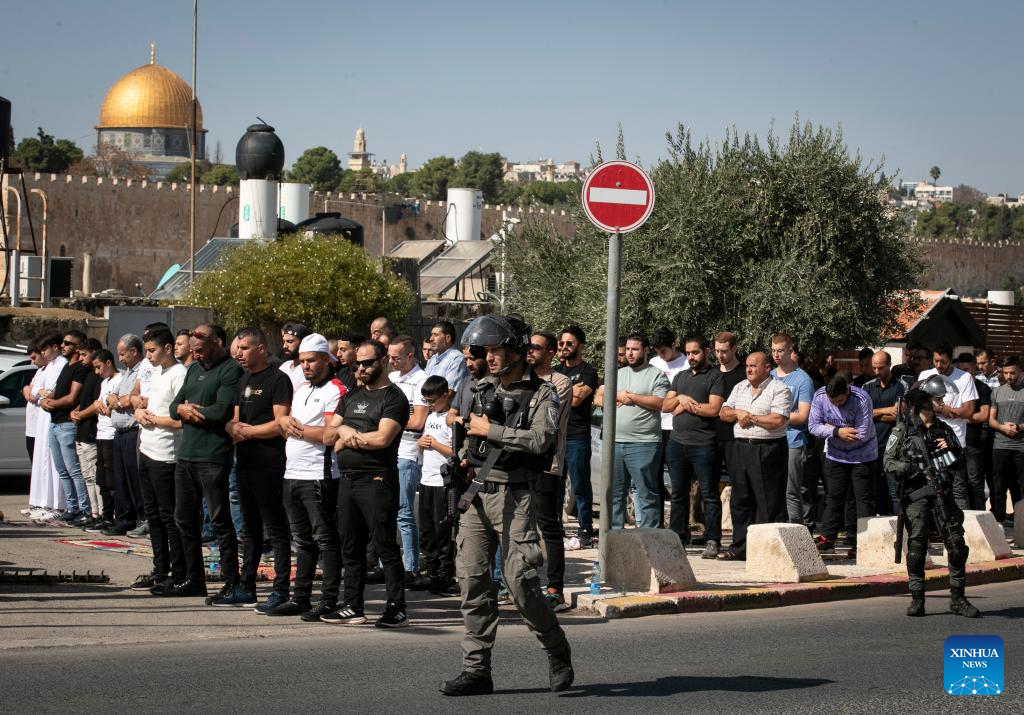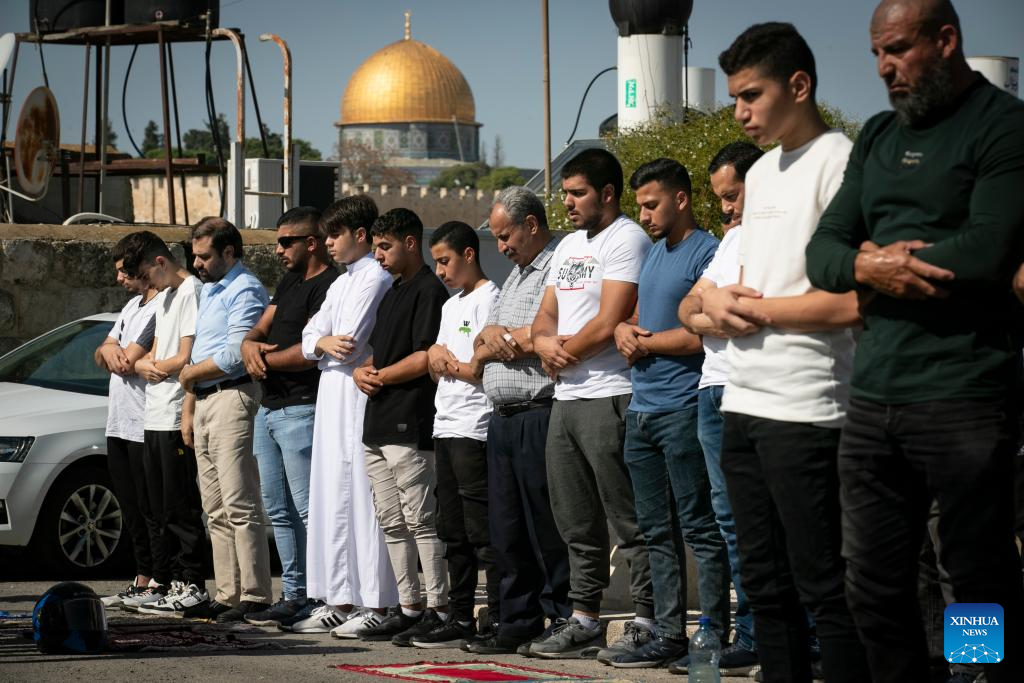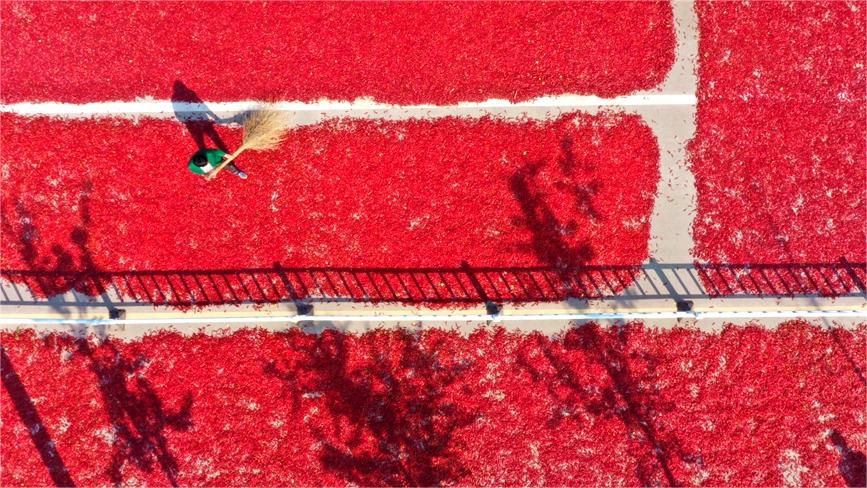Commentary: Over 10,000 deaths make ceasefire in Gaza more urgent

People pray on a street outside the Old City of Jerusalem on Nov. 3, 2023. People are not allowed to perform Jummah prayers in Al-Aqsa Mosque, as security has heightened in Jerusalem on Fridays for the weekly Jummah prayers since the conflict between Palestinian Islamic Resistance Movement (Hamas) and Israel broke out. (Xinhua/Chen Junqing)
BEIJING, Nov. 3 (Xinhua) -- Nearly a month into the ongoing Palestine-Israel conflict, the death toll has surpassed 10,000, one of the worst humanitarian crises in this century.
Sadly, this confrontation has swiftly caused a significant number of casualties within a remarkably short period compared with fatalities from a pandemic and the Ukraine crisis.
Worse still, a ceasefire is nowhere in sight, as Israel has vehemently rejected any humanitarian truce under full-swing support from the United States.
According to the health ministry in Gaza, as of Wednesday, 8,796 people, including 3,648 children and 2,290 women, have been killed and 22,219 injured during the Israeli military offensive on the Palestinian enclave. On the Israeli side, over 1,400 people have been killed, local media reported.
The current situation, where neither side wins, not only brings catastrophe to civilians, but also sows the seeds of renewed animosity between the two sides, intensifying a vicious cycle of hatred between Israelis and Palestinians.
"Ceasefire" is not only a diplomatic term, it is now a matter of life and death for many civilians, both Palestinians and Israelis.
When the international community has shown widespread concern regarding this humanitarian disaster, urging for a ceasefire and condemning attacks on civilians, the support of the United States and its Western allies towards Israel, in contrast, is mind-bending.
A permanent member of the United Nations (UN) Security Council, the United States has vetoed two UN resolutions that, if adopted, would have called for an immediate humanitarian ceasefire and unimpeded provision and distribution of humanitarian aid.
On Oct. 27, the UN General Assembly adopted a resolution that calls for "an immediate, durable and sustained humanitarian truce," and urges immediate humanitarian access to Gaza, with 120 countries voting in favor. The United States voted against it again.
By vetoing UN resolutions and providing military assistance, the United States has added to the gravity of the situation, blocked the prospects for a quick resolution of the Palestinian-Israeli conflict and exacerbated the current humanitarian crisis.
The conflict has also backfired on the United States itself. Protests have erupted in many U.S. cities, exposing the cracks in U.S. society with heightened risks for attacks against Jews. Its ubiquitous military bases in the Middle East are under increasing attack.
Hatred does not go away. It only grows deeper. With civilians suffering immensely in the conflict, the United States is once again helping sow the seeds of hatred between Palestinians and Israelis, exacerbating the vicious circle. A possible spillover of the conflict will also undermine the already fragile security situation in the Middle East.
"Will you continue to allow this jigsaw of war to be completed by aggressive acts, by your disunity, or by sheer neglect? Or will you take the courageous and necessary steps back from the abyss?" UN High Commissioner for Refugees (UNHCR) Filippo Grandi asked.
Instead of vetoing UN resolutions, the United States should leverage its influence on the conflicting parties to achieve a ceasefire, thus preventing the humanitarian disaster from getting worse and avoiding the spillover of the conflict.
The 10,000 lives already lost in the conflict serve as an urgent call for ceasefire. The sooner, the better. ■

People pray on a street outside the Old City of Jerusalem on Nov. 3, 2023. People are not allowed to perform Jummah prayers in Al-Aqsa Mosque, as security has heightened in Jerusalem on Fridays for the weekly Jummah prayers since the conflict between Palestinian Islamic Resistance Movement (Hamas) and Israel broke out. (Xinhua/Chen Junqing)

A man prays on a street outside the Old City of Jerusalem on Nov. 3, 2023. People are not allowed to perform Jummah prayers in Al-Aqsa Mosque, as security has heightened in Jerusalem on Fridays for the weekly Jummah prayers since the conflict between Palestinian Islamic Resistance Movement (Hamas) and Israel broke out. (Xinhua/Chen Junqing)

Police stand guard around the Old City of Jerusalem on Nov. 3, 2023. People are not allowed to perform Jummah prayers in Al-Aqsa Mosque, as security has heightened in Jerusalem on Fridays for the weekly Jummah prayers since the conflict between Palestinian Islamic Resistance Movement (Hamas) and Israel broke out. (Xinhua/Chen Junqing)
Photos
Related Stories
- WHO seeks over 60-mln-USD funding for Gaza, Lebanon health responses
- Israeli tanks advance in southern Gaza following airstrikes on refugee camps
- Israeli army pushes through Gaza City outskirts: sources
- Chinese FM calls for deescalation, ceasefire in Gaza
- 15 killed in Israeli strike on refugee camp in central Gaza: media
- People in Gaza suffer from shortage of necessity supply amid Palestinian-Israeli conflict
Copyright © 2023 People's Daily Online. All Rights Reserved.









